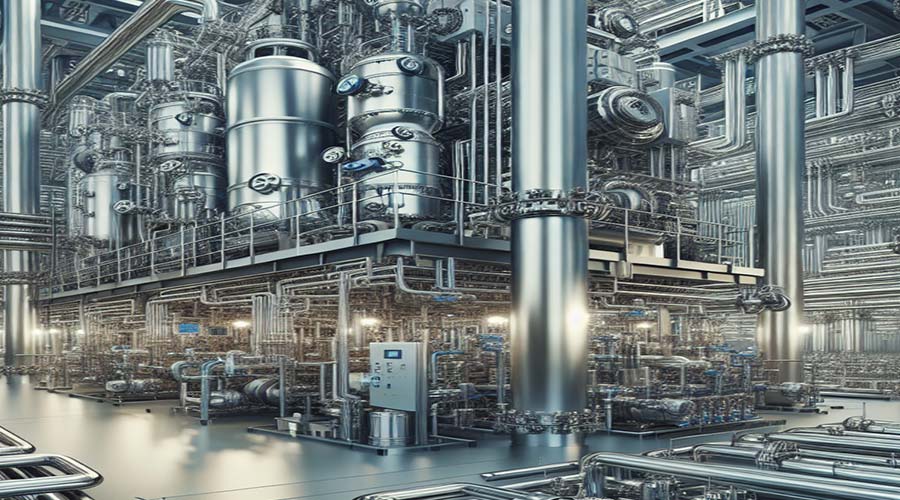The role of lithium bromide in air conditioning systems is crucial for maintaining comfort and efficiency. Specifically, a 50–60% aqueous solution of lithium bromide is widely used as a desiccant, offering unique properties that make it an ideal choice for moisture absorption. This article explores the science behind this application, its benefits, and the reasons why lithium bromide stands out as a preferred desiccant in HVAC systems.
Table of Contents
1. The Science of Lithium Bromide Solutions
Lithium bromide (LiBr) is a hygroscopic compound, meaning it has a strong affinity for water. When dissolved in water to create a 50–60% aqueous solution, it becomes highly effective at absorbing moisture from the air. This characteristic is particularly valuable in air conditioning systems, where controlling humidity is essential for both comfort and system efficiency.
Key Properties of the 50–60% Solution:
- Concentration: The 50–60% concentration is optimal for desiccation, balancing moisture absorption with the need for stability and ease of use.
- Hygroscopic Nature: Lithium bromide’s ability to attract and hold water molecules makes it highly efficient in maintaining low humidity levels.
- Thermal Stability: The solution remains stable under varying temperatures, ensuring consistent performance in different environmental conditions.
2. Application in Air Conditioning Systems
In modern HVAC systems, maintaining the correct humidity level is as important as controlling temperature. Excess moisture can lead to mold growth, discomfort, and even damage to the building structure. A 50–60% aqueous solution of lithium bromide acts as a desiccant, removing excess moisture from the air as it passes through the system.
How It Works:
- Moisture Absorption: As air passes over the lithium bromide solution, the compound absorbs water vapor, reducing the humidity level.
- Energy Efficiency: By lowering the moisture content, the system can operate more efficiently, as less energy is required to cool drier air.
- System Longevity: Reducing humidity also prevents corrosion and wear on system components, extending the lifespan of the HVAC system.
3. Why Lithium Bromide is the Desiccant of Choice
Several factors contribute to the preference for lithium bromide over other desiccants in air conditioning systems:
- Superior Moisture Absorption: Lithium bromide’s hygroscopic properties make it more effective than alternatives like silica gel or calcium chloride.
- Stability: The 50–60% aqueous solution is chemically stable, reducing the risk of degradation over time.
- Cost-Effectiveness: While lithium bromide is a specialized compound, its effectiveness in desiccation reduces overall operational costs by improving energy efficiency and extending system life.
4. Environmental and Safety Considerations
While lithium bromide is effective, it must be handled with care. The solution is non-toxic, but its high concentration can cause irritation if it comes into contact with skin or eyes. Proper safety measures, including gloves and protective eyewear, should be used when handling the solution.
From an environmental perspective, lithium bromide is considered safe. However, care should be taken to prevent spills, as it can be harmful to aquatic life in large quantities.
5. Future Prospects for Lithium Bromide in HVAC Systems
As energy efficiency becomes a more pressing concern, the role of lithium bromide in air conditioning systems is likely to grow. Research into more advanced HVAC systems continues, and lithium bromide’s ability to enhance performance makes it a valuable component in next-generation designs. Innovations in solution concentration and system integration could further optimize its use, making air conditioning systems even more efficient and environmentally friendly.
6. Frequently Asked Questions (FAQs)
Q1: What is the role of a 50–60% aqueous solution of lithium bromide in air conditioning?
A1: The solution acts as a desiccant, absorbing moisture from the air to reduce humidity levels in HVAC systems.
Q2: Why is lithium bromide preferred over other desiccants?
A2: Lithium bromide offers superior moisture absorption, chemical stability, and cost-effectiveness compared to alternatives like silica gel or calcium chloride.
Q3: How does reducing humidity improve air conditioning efficiency?
A3: Lower humidity levels mean that the air is easier to cool, allowing the system to operate more efficiently and use less energy.
Q4: Are there any safety concerns with using lithium bromide?
A4: While generally safe, lithium bromide should be handled with protective gear to avoid irritation, and spills should be managed carefully to protect the environment.
Q5: What are the future trends for lithium bromide in HVAC systems?
A5: Ongoing research aims to further improve energy efficiency and environmental safety, positioning lithium bromide as a key component in advanced air conditioning systems.
7. Conclusion
The use of a 50–60% aqueous solution of lithium bromide in air conditioning systems exemplifies how a chemical compound can revolutionize an industry. With its superior moisture absorption capabilities, stability, and cost-effectiveness, lithium bromide remains the desiccant of choice for maintaining optimal humidity levels in HVAC systems. As technology advances, its role is set to expand, contributing to more efficient and sustainable air conditioning solutions.
For more insights on lithium bromide solutions, explore our Lithium Bromide Products or Contact Honrel Company to find the right solution for your needs.









